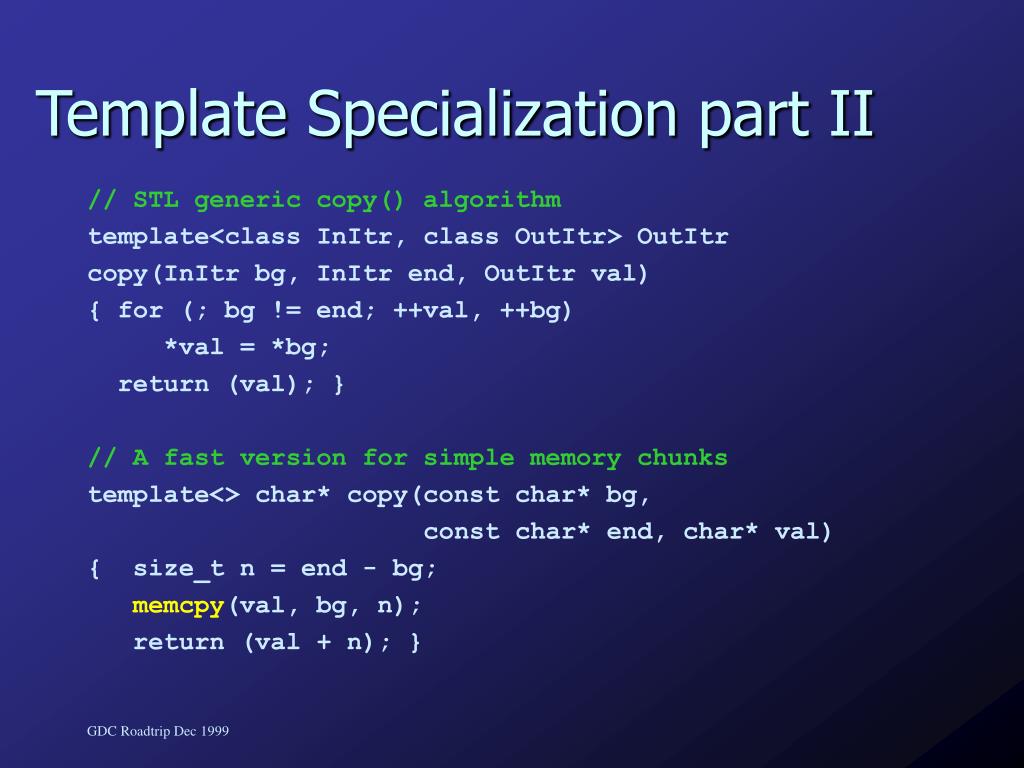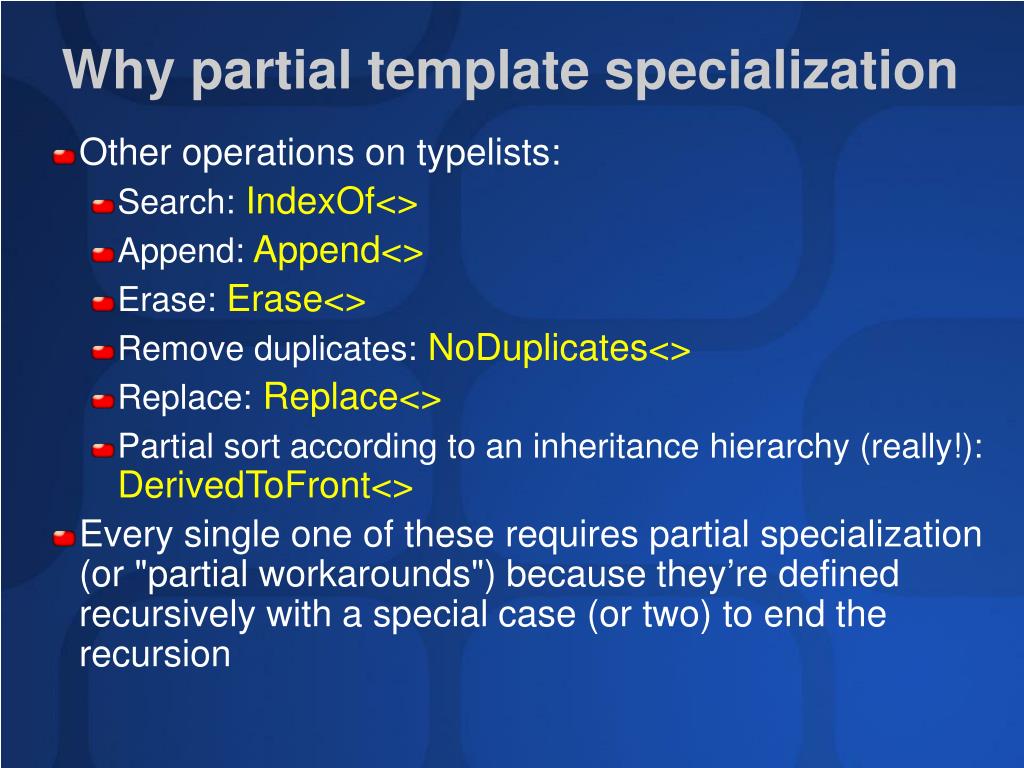C++ Partial Template Specialization
C++ Partial Template Specialization - Web partial specialization allows template code to be partially customized for specific types in situations, such as: Yes it does, it isn't a full specialization until all parameters in the template parameter list have been specialized/specified, e.g. The template arguments to a partial template specialization do not need to be arguments to the template itself. Web c++ allows to partially specialize class templates: Template struct test<int, j> {int j = j;}; Allows customizing class and variable (since c++14) templates for a given category of template arguments. Web template partial specialization partial template specialization stems from similar motives as full specialization as described above. Web partial template specialization allows us to specialize classes (but not individual functions!) where some, but not all, of the template parameters have been. This time, however, instead of. When a class or variable (since c++14)template is instantiated, and there are partial specializations available, the compiler has to decide if the primary template is going to be used or one of its partial specializations. Template struct test<int, j> {int j = j;}; Web partial template specialization is a particular form of class template specialization. Informally a is more specialized than b means a accepts a subset of the types that b accepts. Web in this case, we’ll use class partial template specialization to define a special version of the storage class that works for. Web one such scenario that frequently comes into play is partial template specialization.in this blog post, we will look at how partial template specialization is performed in c++17. Web it is possible in c++ to get a special behavior for a particular data type. Web in this case, we’ll use class partial template specialization to define a special version of. Web the following basic example of partial template class specialization, taken from this wiki page: Web partial specialization allows template code to be partially customized for specific types in situations, such as: Web fortunately, c++ provides us a better method: Web for example, let's define a template and two partial specializations: Web partial template specialization allows us to specialize classes. Web partial specializations of member template may appear both at class scope and at enclosing namespace scope. Template allows us to define generic classes and. Template struct s { static void foo () { std::cout << general case\n; Web partial template specialization allows us to specialize classes (but not individual functions!) where some, but not all, of the template parameters. Web partial specialization allows template code to be partially customized for specific types in situations, such as: Web template partial specialization partial template specialization stems from similar motives as full specialization as described above. Web a partial specialization has both a template argument list and a template parameter list. Web explicit (full) template specialization from cppreference.com < cpp | language. Web template partial specialization partial template specialization stems from similar motives as full specialization as described above. Allows customizing class and variable (since c++14) templates for a given category of template arguments. Web partial template specialization allows us to specialize classes (but not individual functions!) where some, but not all, of the template parameters have been. Web one such scenario. Web for example, let's define a template and two partial specializations: Yes it does, it isn't a full specialization until all parameters in the template parameter list have been specialized/specified, e.g. Informally a is more specialized than b means a accepts a subset of the types that b accepts. Web partial template specialization allows us to specialize classes (but not. Web fortunately, c++ provides us a better method: The template arguments to a partial template specialization do not need to be arguments to the template itself. Web a partial specialization has both a template argument list and a template parameter list. Those can be put in class. Web the following basic example of partial template class specialization, taken from this. Web well the example in 14.6.5.3/2 in the c++0x draft is a partial specialization. Web using partial specialization in c++11. Informally a is more specialized than b means a accepts a subset of the types that b accepts. Web partial template specialization allows us to specialize classes (but not individual functions!) where some, but not all, of the template parameters. This is called template specialization. Web it is possible in c++ to get a special behavior for a particular data type. Explicit specializations may appear in any scope in. Web the following basic example of partial template class specialization, taken from this wiki page: Yes it does, it isn't a full specialization until all parameters in the template parameter list. Web template partial specialization partial template specialization stems from similar motives as full specialization as described above. Template class keyvaluepair { /*. Template struct s { static void foo () { std::cout << general case\n; Web partial specialization allows template code to be partially customized for specific types in situations, such as: Int main () { test jj;.</p> Those can be put in class. Yes it does, it isn't a full specialization until all parameters in the template parameter list have been specialized/specified, e.g. When a class or variable (since c++14)template is instantiated, and there are partial specializations available, the compiler has to decide if the primary template is going to be used or one of its partial specializations. Web explicit (full) template specialization from cppreference.com < cpp | language c++ compiler support freestanding and hosted language standard library. Web and determines which specialization to use. Template int</strong> i=44> struct test {t j = i;}; Web for example, let's define a template and two partial specializations: Web using partial specialization in c++11. This is called template specialization. The compiler uses the partial specialization if its template argument list matches a. Allows customizing class and variable (since c++14) templates for a given category of template arguments. For partial specializations, those restrictions aren't in place. Usually used in reference to the c++ programming language, it allows the programmer to. Web in this case, we’ll use class partial template specialization to define a special version of the storage class that works for pointer values. Web fortunately, c++ provides us a better method:C++ Partial template specialization triggering static_asserts YouTube
C++ Partial Template Specialization
C++ Template partial specialization for __stdcall function pointer
C++ Partial Template Specialization
C++ Partial template function specialization with enable_if make
[Solved] C++ template partial specialization 9to5Answer
C++ Partial Template Specialization
[Solved] C++ function template partial specialization? 9to5Answer
C++ Default template parameter partial specialization YouTube
C++ `template auto ` and partial class template specialization
Related Post:







